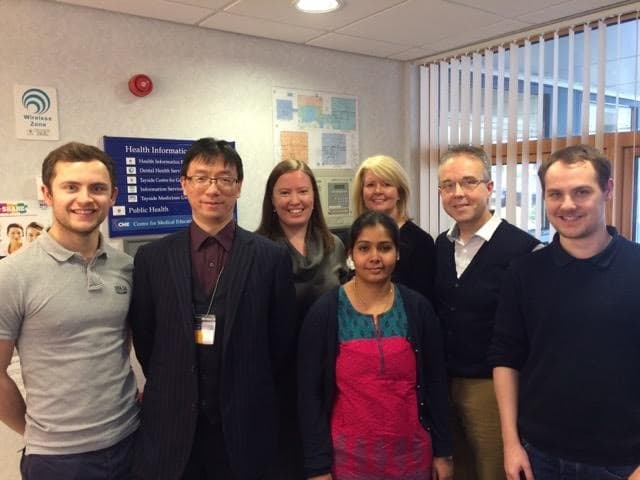PATCH-sponsored research into unscheduled care and cancer – a huge amount of progress
A first year report on PATCH funded research into patients with advanced cancer who are seen urgently at A+E and GP Out-of-Hours services because of pain.
There continue to be many reports of patients with advanced cancer who are seen out of hours because of pain. Many of these patients are seen in Accident and Emergency Departments and may need to be admitted to hospital.
Dr Sarah Mills SCREDS Lecturer in General Practice, Tayside Scotland is working collaboratively with the Departments of Palliative and Supportive Care and Oncology, Ninewells Hospital, Dundee to study this is depth.

Sarah Mills (3rd from left) with the Chronic Pain research team in the Population Health Sciences department.
Dr Mills has just recently been awarded a Fellowship to continue this work which she is developing towards her MD. She is delighted to have been funded by PATCH to present this research at the WONCA Europe international conference of primary care physicians in Denmark this July.
First year report into PATCH funded research into patients with advanced cancer who are seen urgently at A+E because of pain
Dr Sarah Mills, SCREDS Lecturer in General Practice, Tayside
The last year has seen a huge amount of progress with the PATCH-sponsored research into unscheduled care and cancer.
First, it was necessary to define a cohort of patients whom we could study, namely those patients in Tayside who have died from cancer in a three-year period, from 2011-2014. The cohort was identified using General Register Office ‘Cause of Death’ Data. Routinely collected clinical data from all unscheduled care during their last year of life was collected and linked to demographic and prescribing datasets using patient Community Health Index (CHI) numbers. The CHI is a unique patient identification number used in all clinical encounters in both general practice and hospital services.
The A&E data has given us a wealth of information, including the percentage of patients with cancer who use A&E, the frequency with which they attend, their reasons for attendance and when they attend relative to their date of diagnosis and date of death. We have defined 197 clinical reasons for why patients present to A&E and have examined the most common reasons for seeking emergency care. We are in the process of convening a group of experts in order to decide which presentations are directly pain-related and cancer-related. We have looked at ways in which patients present, whether they are accompanied by family and friends, what medications they are given and whether they are admitted, discharged or transferred. By mapping these trends over time we can also see how these patterns change in the few weeks before death.
Comparing GP Out Of Hours and A&E data has shown that patients with cancer present frequently to unscheduled care and that such presentations become more common in the weeks before death often due to uncontrolled pain. Initial analyses have demonstrated vital information about how, why, when and where patients with cancer access unscheduled care services. This research can potentially identify factors associated with unscheduled care use, suggest clinical and service provision changes to improve the patient journey in patients with terminal cancer and ensure quick access to pain and symptom control.
The preliminary findings of this research have been presented at the Scottish Pain Research Community Annual Conference (SPaRC) and the University of Dundee College Research Symposium. At both occasions the research has been very well received and PATCH has been credited for the research funding.